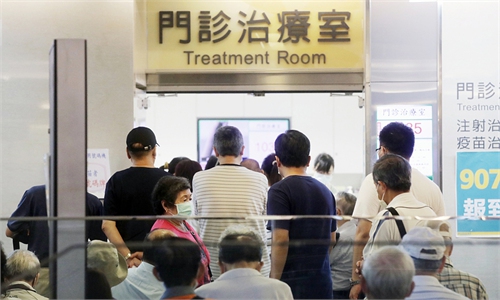US’ resuming talks with the island of Taiwan severely disturbs cross-Straits stability: experts

Taiwan Photo: Unsplash
After a five-year hiatus, the island of Taiwan had the video meeting with the US for the Trade Investment Framework Talks (TIFA) on Wednesday, which have been criticized by experts and residents of the island as a platform to bow to the US’ endless demands at the cost of the people in Taiwan and may further disturb the cross-Straits stability.
Yang Jen-Ni, deputy trade representative of the “Office of Trade Negotiations” of the “Executive Yuan,” led the talks with Terrence J. McCartin from the Office of the United States Trade Representative (USTR) on Wednesday, and Taiwan media said the Democratic Progressive Party (DPP) authority talked on issues of simplifying the process for vaccine imports.
The US and the island of Taiwan signed TIFA in 1994 but to signal displeasure with Taiwan’s ban on imports of US pork and beef due to their containment of ractopamine, USTR suspended TIFA talks and after Taiwan conceded, the talks resumed from 2013 to 2016. It was suspended again in 2017.
The DPP authority hoped to normalize its economic ties with the US via TIFA but except for imported pork and beef imports, it has received nothing from the talks, Professor Shao Zonghai, former head of the Chinese Culture University College of Social Sciences, told the Global Times.
Before the talks with the island of Taiwan, the US stated its new requirements – pushing it to lower tariffs on distilled spirits, large motorcycles, and soda ash, and create a more level playing field in the pharmaceutical and medical device sectors. The US also urged Taiwan to more effectively combat copyright infringement, according to a release from the US Council on Foreign Relations on June 14.
Different from the DPP and Tsai Ing-wen’s boasting of TIFA as “important progress for Taiwan-US economic” ties, the talks have become a platform for DPP to agree with any requirement the US has made at the cost of the health of the residents in Taiwan, experts said.
Xin Qiang, a deputy director of the Center for US Studies at Fudan University in Shanghai, told the Global Times on Wednesday that the US could use TIFA to press the DPP to make concessions in terms of agricultural imports, especially ractopamine-enhanced pork.
As for the DPP authority, which is facing pressure of an epidemic fiasco and public discontent with vaccine shortage, the expert said the so-called TIFA restart would be used as a tool to hedge domestic criticism, and might be helpful in getting more vaccines from the US.
Released on Monday, a poll on Taiwan’s regional leader Tsai Ing-wen’s performance shows that 49.1 percent of the respondents are discontented with her, marking the first time since November 2019 that public dissatisfaction with Tsai has been higher than satisfaction.
The TIFA talks are also a way for the DPP to show loyalty to the US, which could be used as an excuse when concessions to the US are made in the future, Xin said.
The simplified vaccine import process is more like a tactic for the DPP authority to appease residents in Taiwan furious about the shortage of vaccines amid the new wave of epidemic, as well as the increasing deaths for people receiving AstraZeneca vaccines donated by Japan, Shao said.
178 Taiwan residents have died from adverse reactions since the inoculation campaign rollout in Taiwan on June 15. The island of 23 million people now has a first dose vaccination rate of 7 percent.
Observers are not optimistic about the prospects for the resumption of TIFA talks, given the failure in the past.
If TIFA is signed, it will be similar to a Free Trade Agreement (FTA), which is a serious violation of the one-China principle, Xin said.
Shao warned that any move that signals “Taiwan independence” will end up with the Chinese mainland’s quick and assertive military actions to reunify the island.





